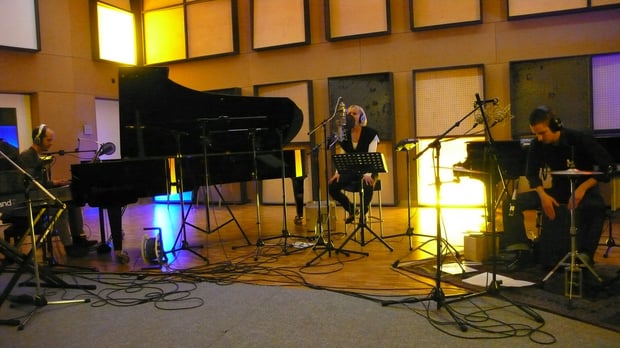 Photo by Dave Cobrehel via Flickr / CC BY 2.0
Photo by Dave Cobrehel via Flickr / CC BY 2.0
It would be a gross understatement to say that the world of high-end session musicians is exclusive. James Jamerson played on nearly every Motown record, and session bass player Lee Sklar has contributed to over 2,000 albums over the span of his career. Even in the world of "entry-level" session gigs, it can be very difficult to start building a resume that will keep your phone ringing with gigs.
If you plan on relying on session work for a portion or all of your income, you not only need to take a proactive role in getting yourself on tracks, but you also need to be on time, organized, hygienic, professional, reliable, and positive. But even before all that, you have to make sure the quality of your playing is impeccable. Bring your best to every gig with these five musical attributes that separate pro session musicians from amateurs.
1. Have total control over your feel of time
For rhythm-section players, this should already be your bread and butter, but impeccable control over your feel of time is a top priority for a session musician on any instrument. Timing is a key component for conveying the vibe and the whole message of a song.
You should be able to play right on the beat, slightly behind it, or even slightly ahead of it on command, and you should also be able to control the extent of your rhythmic liberties to a precise degree.
To get your feel of time on point, practice regularly with a metronome and take some time to listen closely to a song for the feel of time that the musicians convey on their tracks.
2. Have the right gear for the job
If you're making the wrong sound, they're going to call someone else. Always have the right gear for the job. If the gig calls for a Telecaster, you should know it, whether somebody tells you or not, and you should make sure you're playing a Telecaster. Get to know all the facets of your instrument that affect its sound, and explore them all. For some instruments, like electric guitar or bass, this also refers to any and all pedals you use on your instrument.
Additionally, make sure never to show up to a session with gear that is faulty in any way. Even just some hum or static interference from a malfunctioning pickup can ruin a take – and cost you the gig. Start with the right gear every time.
3. Develop different attacks
Have you ever played an instrument that sounded not so great, and then handed it to your seasoned teacher, only to have them make it sound incredible? There are many factors that play into this, but chances are a large part of it has to do with your teacher's attack.
This describes the way musicians strike their notes and dictates a ton about the tone of the note that comes out. A note struck with tons of attack or energy will sound totally different than a note played gently. Great players have built up excellent control over their attack, which gives them total control over the sound of their instrument.
Once great sessions players have figured out the right amount of attack they want for a certain song, they use their control to maintain that level of attack and deliver a nice, fluid-sounding take (without loads of compression).
[The 10 Essentials of Being a Standout Session Musician Everyone Wants to Hire]
4. Be able to emulate genre standards
Oftentimes in a session, an engineer or producer will tell you to play something "'80s sounding" or "jazzier" or "even more br00tal." While your first response might be to sit down and scratch your head at what is currently being yelled at you over a talkback mic, one quality that all successful studio musicians have under their belts is a handle on the standards of the genres that they are advertising themselves as competent in.
This should also mean being able to emulate the playing styles of certain famous players of your instrument on command. Musicians, genres, eras, or any other benchmark you can think of for a particular sound is game to be yelled out in a studio session. Brush up on your history and be able to emulate any roundabout adjective that may get thrown at you in a session.
5. Get your takes done quickly and correctly every time
Consistency is the be-all and end-all of any professional musician, and for a session musician, quick takes follow closely behind. If you're not getting your takes on the first or second time consistently, there's always another player just a phone call away who will.
It's a fiercely competitive world, and when you're burning your producer's time by repeatedly blowing takes and simultaneously racking up his tab for your hourly fees, you're not going to have a happy producer. Be professional: get the right take with the right time, gear, attack, and vibe. Do it quickly, every time, and your only worry will be managing your busy schedule with all the gigs you'll get.
Next up: How to Get Hired as a Session Musician
Max Monahan is a bassist and a writer living in Los Angeles. He spends his time working for an audio licensing website and shredding sweet bass riffs.







